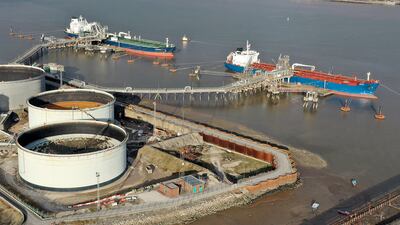Volatile commodity prices, fragmented economic growth and fragile geopolitics stemming from increased energy interdependence have emerged as top concerns that will add to the uncertainty of achieving the global energy agenda, according to the World Energy Council.
The volatility in hydrocarbon prices were the biggest critical concern across almost all regions in 2021, a 12 times increase from 2020, the World Energy Council said in its annual World Energy Issues Monitor on Thursday.
Record price increases in natural gas, driven by shortages and supply bottlenecks, particularly in the UK and Europe, have contributed to the climate of uncertainty. Northern European and Asian gas markets are also similarly affected.
Wild swings in oil prices also “speak for themselves”, said the report, which surveyed 2,200 energy industry executives and government and civil society leaders from 108 countries, said.
The implications of this “tremendous oscillation in commodities markets are profound and not yet fully understood”. However, it is clear that investment decisions in major energy projects have been affected, the report said.
“Energy matters are now centre stage in a world of more digitally connected, politically contested, interdependent and diverse societies,” said Angela Wilkinson, secretary general of the World Energy Council.
The report underlines the increasing global uncertainty about the collective ability to manage “a steady global energy transition”, as rising energy costs and shifting geopolitics hinder the ability to find solutions to address climate change, she said.
“Leadership uncertainty reflects the complex challenges of co-ordinating actions on net-zero energy uses, without triggering new threats to regional and global stability,” Ms Wilkinson said.
Prices of natural gas rose steeply last year amid supply chain disruptions and a rise in demand for cleaner fuels for power generation by governments seeking to meet their climate pledges.
Crude prices, which rallied about 67 per cent last year amid steady demand despite coronavirus-induced uncertainties, have carried their momentum into 2022. Oil futures in New York rose as much as 2 per cent on Wednesday, touching $90 a barrel for the first time in seven years.
Brent, the benchmark for more than half of the world’s crude, was trading 0.76 per cent lower at $89.25 per barrel while US crude gauge WTI was down 0.79 per cent at $86.66 a barrel at 9.51am UAE time.
The geopolitics of energy also scored high in the latest report. This higher impact score reflects the perceptions of big energy players such as the US, China and Russia.
Continued energy interdependence, despite record growth in renewable capacity, and growing trade tensions contributed to keeping geopolitics on the critical uncertainty list.
secretary general of the World Energy Council
Despite a degree of optimism coming out of Cop26, climate change was not at the top of leaders’ list of critical uncertainties, the report said. Bucking this trend, North America emerged as the only region where climate change management was attributed the highest degree of impact.
Renewable energy, a long-standing priority for energy leaders, remained at the top of the action priority agenda in this year’s report.
Global renewable energy capacity jumped 4.7 per cent in 2021, a record year for renewables worldwide.
New installed renewable capacity rose to 227 gigawatts this year, mainly driven by residential solar, offshore wind projects, as well as other forms of stored energy including batteries, according to Norway-based consultancy Rystad Energy.
Renewables were a focus area, notably in the Middle East and the six-member GCC economic bloc, where they form a key pillar of energy transition strategies, the World Energy Council report said.
Countries such as the UAE, Saudi Arabia and Bahrain have already pledged to achieve carbon neutrality by the middle of the century. The UAE plans to invest $160 billion over the next three decades to speed up renewable energy development.
Hydrogen is another focus area for GCC countries but the energy leaders view it with a high degree of uncertainty across most regions as the nascent industry explores ways to build a functioning hydrogen economy, the report said.
The report also underscored a focus on issues affecting equity, with access to quality energy becoming a priority for the first time across all regions.
“Commodity prices are inherently linked to system costs, affordability, taxation and, crucially, equity. Humanising energy is an imperative – we must involve more people and voices, community solutions and ways of holding leaders to account,” Ms Wilkinson said.
“Better solutions for people and planet will require new models of human and economic development and a shift from incremental improvements to transformational strategies that work across borders, across sectors, involve all levels of society and deal with more than one issue at a time.”


